As other top law schools boycott US News rankings, NYU stays put
NYU’s law school, ranked as the seventh best in the country, has yet to follow other top schools in leaving the U.S. News & World Reports’ law school rankings.
(Illustration by Susan Behrends Valenzuela)
December 2, 2022
NYU Law is one of five schools out of the top 14 in the country that has not yet withdrawn from the U.S. News & World Reports’ law school rankings. Nine of these top schools, commonly referred to as the T14, have announced that they will leave the rankings, many citing issues with the report’s methodology and claiming that the rankings are harmful to legal education.
U.S. News has announced that it will continue to rank institutions that have dropped out using publicly available data. Michael Orey, a spokesperson for NYU Law, said that the school has not yet made a determination on whether it will remain in the rankings.
Many law schools that have announced their departure from the rankings cited concerns over the prioritization of test scores, grades and employment after graduation. Some have said the rankings prioritize providing merit-based financial aid over need-based aid and discourage careers in public service law.
Of the colleges with law schools in the top 14, Yale University; Harvard University; Stanford University; Columbia University; the University of California, Berkeley; Georgetown University; Northwestern University; Duke University and the University of Michigan will no longer participate.
Law school administrators outside of the top 14 schools have said that although they share similar concerns regarding the rankings, they serve as a valuable tool for universities that are below the T14 to attract potential students and faculty.
David Bloomfield, an expert in education law who teaches at Brooklyn College and the City University of New York Graduate Center, said that lower-ranked universities do not have as much of a choice in whether they take part in the rankings because many cannot afford to leave them. He added that he thinks the rankings are no longer convenient for the highly-ranked institutions that have dropped out.
“There’s a snowball effect: Yale withdrew, and that gave cover for others to withdraw as well — how far down the hill the snowball will roll is open to question,” Bloomfield said. “People will continue to believe that Yale and Columbia and Stanford and Georgetown are top law schools; their reputation will remain intact.”
Currently, the report takes into account the placement of graduates, resources available to faculty, the academic achievements of new students and testimonies from law schools, lawyers and judges. In the 2023 rankings, the methodology changed to include the pass rate for the bar exam by those who took it for the first time, and changed its evaluation of available library resources to an assessment of student support from librarians.
The publication collected data from law schools regarding statistics and reputation for the report. A total of 14 metrics were used to determine the rankings, a decrease from 20 in the 2022 report.
Bloomfield also said that because the rankings fulfill a market need for both universities and U.S. News, it is likely that they will continue to exist in the future. He said he thinks that it is possible that the universities that have left the rankings are trying to pressure U.S. News to change its metrics rather than oppose rankings altogether.
“The U.S. News rankings are a pimple on the ass of all American higher education — they’re highly manipulable, unreliable, and skew toward social injustice by promoting a system of elitism at odds with good education and individual circumstance,” he said. “Students are highly attuned to simplistic notions of quality, and that’s what U.S. News delivers.”
Contact Carmo Moniz at [email protected].



























































































































































